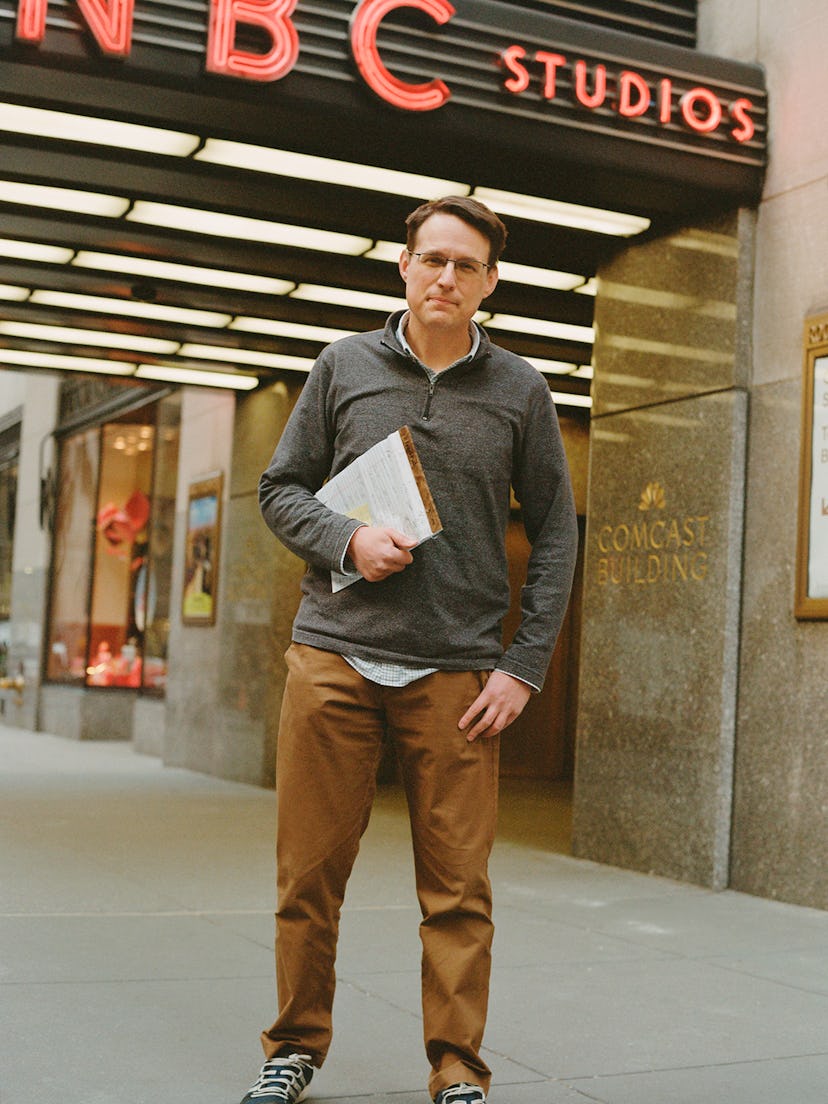The Originals: Steve Kornacki
Catching up outside 30 Rock with the NBC News and MSNBC National Political Correspondent, data wizard, and unwitting style icon.

Your marathon election coverage was the stuff of legend. Are you still recuperating?
We started at 6 p.m. on Tuesday night. Wednesday into Thursday I got a couple of hours of sleep, then I went right back in. Thursday into Friday we did round the clock again, and I was on all night. That was the night Biden took the lead in Georgia; it was at three or four in the morning. There’s a board I use on the air, and right behind it we had a couple of folding chairs and a table. I’d come off air and sit down, and my eyes would be so heavy I could’ve fallen asleep. But then, as soon as we got an update, I would get a burst of energy, and I had no problem. I didn’t feel tired on the air. The election was finally called at around 11:30 a.m. on Saturday, and I was out of the studio by noon.
You’ve suddenly become a style icon for your uniform of Gap khakis, white shirt, and tie. When you were a kid, did you have to wear a uniform at school?
It’s been a very strange thing to see the attention my clothes have gotten, just because it’s so inversely related to the amount of thought I put into them. I went to a public school, so we didn’t have to wear a tie. I still couldn’t even tie a tie if you asked me to. In terms of the pants, they say consumer habits lock in at a fairly young age. Well, about 20 years ago, I wore these pants and was like, Ah, this works for me, and out of habit, I just buy them over and over, and never give it any thought.
Wait, you don’t know how to tie a tie?
No. I learned you just need to know people who know how to tie ties, and they’ll tie them for you, and you can just put them on and take them off. I have a rack in my office that has three ties on it right now, and they’re all tied, so they’re ready to go.
How does it feel to become such a beloved public figure? You’ve made People’s “Sexiest Man Alive!” list, have celebrities screaming your name, and have been on all the talk shows.
Since this is all playing out during the pandemic, I don’t really feel it; it’s not like I’m going anywhere. It’s been flattering to see some of the stuff online, but weird. I also figure these things come and go.
What’s the strangest thing a fan has sent you?
I received a bunch of ties. And like I said, I can’t really tie them.
You crunch statistics and data. Were you good at math in school?
I was probably the worst calculus student in the history of my high school. To this day, I have stress dreams that I’m back in trigonometry or calculus, trying to figure out the volume of a cone or a sphere. But for whatever reason, I’m good with computational math, adding and subtracting on the fly. And I did actually do statistics for my high school basketball team.
How was it jumping from the election to breaking down NFL playoff probabilities for Sunday Night Football?
It flowed naturally. I was doing “Road to 270” for two months at the board—“If Biden wins this state, but if Trump wins this state”—and it’s the same thing for playoffs: “Look, if the Steelers lose this game next week and the Bills win this game, it’s going to reshape the playoff picture like this.” I’m a big sports fan and follow this stuff to begin with, so it was a really similar approach.
You wrote a book in 2018, The Red and the Blue, about the birth of tribalism in our political parties. Do you see a corollary between sports and politics these days?
The tribalism of sports is seeping into our politics. In sports, if the ref makes a call and it goes against the home team, it doesn’t matter if the call is right or wrong, the crowd is going to jeer. And if the call goes in the home team’s favor, the crowd is going to cheer, and again, it doesn’t have anything to do with whether the call itself is right or wrong. It has to do with, did it help or hurt the team we’re cheering for? That’s a healthy thing in sports, but I don’t think that’s a healthy thing in politics.
What does the rest of 2021 hold for you?
I’m as curious as anybody about what American politics are going to look like a month, three months, six months from now. There’ll be midterm elections next year. There’ll be a couple of gubernatorial elections this fall. The New York City mayor’s race will be later this year. There will be, I’m sure, some high-stakes special elections. I know wherever they are, whenever they are, whatever they are, I’ll be covering them live as the votes come in.
This article was originally published on